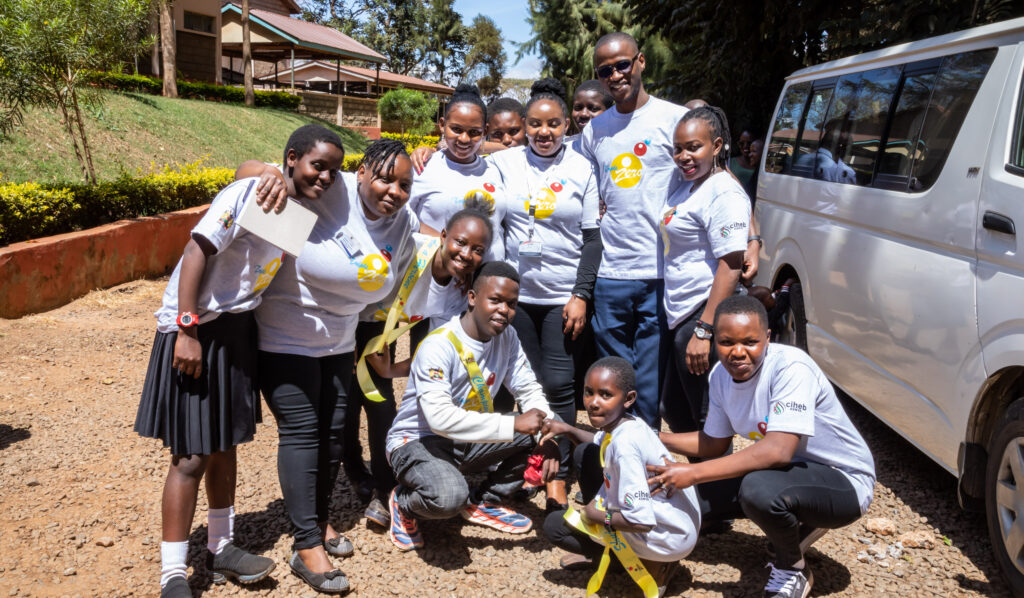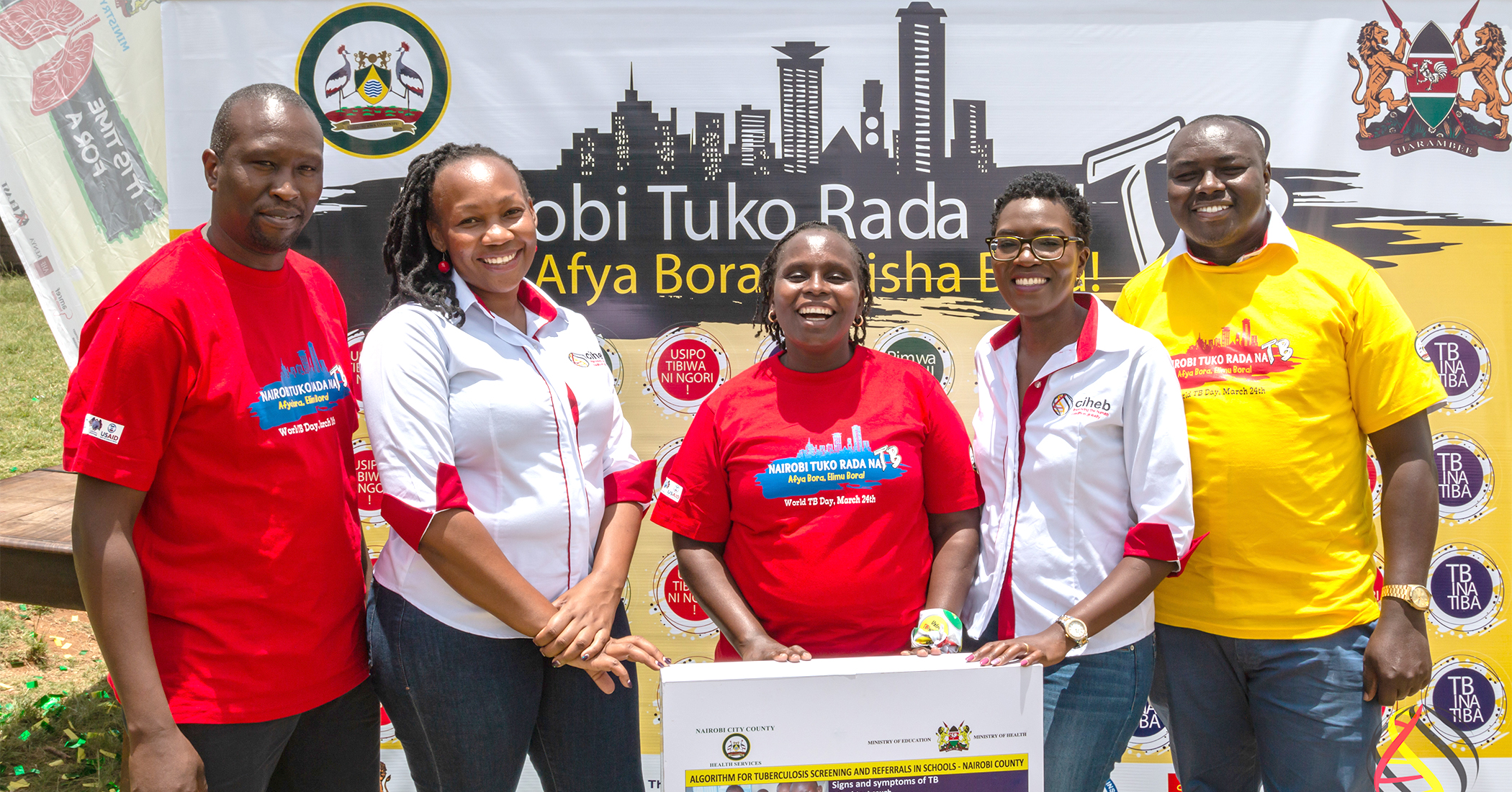Kenya
Ciheb’s work in Kenya continues to make progress in building health systems capacity and in expanding prevention efforts for HIV and tuberculosis (TB). Ciheb is implementing five projects in Kenya funded by the National Institutes of Health (NIH) and the Centers for Disease Control and Prevention (CDC) under the President’s Emergency Plan for AIDS Relief (PEPFAR).
Projects
The Partnership for Advanced Care and Treatment (PACT) Imara. This five-year program is funded by the United States Presidents Emergency Plan for AIDS Relief (PEPFAR) through the US Centers for Disease Control and Prevention (CDC). The program supports the provision of comprehensive HIV and TB prevention and treatment services for general, key, and priority populations in Machakos, Makueni, and Kitui counties, providing antiretroviral therapy for approximately 66,000 people living with HIV (PLHIV) across 227 facilities in these counties, (89 in Kitui, 70 in Machakos and 68 in Makueni County).

The program works with the respective county health management teams to achieve HIV epidemic control through focusing on the following activities:
- Provision of HIV prevention interventions for general and key populations including HIV pre-exposure prophylaxis (PrEP) services and gender-based violence (GBV) services
- Provision of high-quality targeted HIV testing services (HTS) leading to the identification and linkage of HIV-infected individuals to HIV care
- Provision of HIV prevention and treatment services for pregnant and breastfeeding women and HIV-exposed infants
- Provision of quality patient-centered HIV care and treatment services for PLHIV, including management of comorbidities
- Provision of quality collaborative TB and HIV services to reduce the burden of TB among PLHIV
- Strengthening of health systems to support the delivery of HIV and TB-related services including laboratory systems, commodity management, and monitoring and evaluation systems
- Institutionalization of continuous quality improvement (CQI) frameworks in health service delivery for improved health service quality and enhanced effectiveness and efficiency in health systems
- Strengthening county health systems to ensure the transition to sustainable high quality HIV service delivery
Tobacco Cessation Study. Ciheb’s first NIH-funded randomized control trial is examining tobacco cessation pharmacotherapy and behavioral interventions among HIV-infected individuals. HIV has been shown to be associated with a greater likelihood of tobacco use, which further aggravates the risk of non-communicable diseases and which are now seen to be causing increasing morbidity and mortality in HIV. Unfortunately, smoking cessation interventions are not included as part of the comprehensive package of services currently provided in HIV treatment clinics. In this second year of implementation, the study conducted formative research, completing 50 participant interviews and three focus group discussions that provided useful information on the study populations and guided the finalization of the study instruments.
Technical Assistance to Ready and Accelerate Capacities of Public Health Programs in Kenya (TRACK). The TRACK grant is a newly awarded five-year US Centers for Disease Control and Prevention funded program. In its first year, Ciheb-Kenya worked with the Ministry of Health to provide support for COVID-19 vaccine preparedness and disease prevention and ensure that priority counties —Nairobi, Kisumu, and Siaya — were prepared for implementation and distribution of the vaccine and other therapeutics.
The TRACK Program’s scope was increased to 15 counties at the request of the Task Force for Global Health. The additional counties include Busia, Homa Bay, Mombasa, Migori, Nyeri, Kiambu, Kakamega, Kisii, Muranga, Makueni, and Machakos.

County Ownership and Networks to maintain Nairobi Epidemic Control (CONNECT). The program is supporting the implementation and expansion of high quality, sustainable, and comprehensive HIV prevention, care, and treatment programs in Nairobi County with funding from the United States President's Emergency Plan for AIDS Relief (PEPFAR) through the Center for Disease Control and Prevention
The program’s goal is to fast-track progress towards the UNAIDS 95-95-95 targets of HIV epidemic control and to reduce HIV incidence and AIDS-related mortality as per Kenya AIDS Strategic Framework II.

Enhancing Technical Responses to HIV Epidemic control through Nimble County Health systems (ENTRENCH). ENTRENCH is funded by the US President’s Emergency Plan for AIDS Relief (PEPFAR) through Centers for Disease Control and Prevention (CDC) and supports HIV and TB services in Kisumu and Migori Counties. These counties are among those with the highest HIV burden in Kenya, with prevalence of 16.3% for Kisumu and 13.3% for Migori (Kenya’s overall HIV prevalence is 6%).
The goal of CIHEB ENTRENCH is to provide evidence-based technical support to the two county governments while strengthening Kisumu and Migori County health systems through an integrated and sustainable model that will build the capacity of the county health management team (CHMT) to provide oversight and technical support for HIV/TB activities in their health facilities. This includes enhancing the counties’ capacity to coordinate, manage, and lead HIV/TB service provision, sustaining the gains made, and reaching the last mile of epidemic control.
ENTRENCH program, in collaboration with the Kisumu and Migori County health management teams, has engaged highly qualified and skilled human resource in health who deliver the essential health services in supported facilities. The program delivers person-centered services that recognize and respond to what is important to the people while actively engaging and meaningfully involving the communities affected.

USAID Stawisha Pwani Project. Stawisha Pwani program is 5-year program funded by the President’s Emergency Plan for AIDS Relief (PEPFAR) through the US Agency for International Development (USAID).
The project implementation approaches focus on strengthening county leadership and management capacity for county-led processes with county health management system leading the delivery of supported services from planning, financing, implementation, and monitoring of supported services. CIHEB-Kenya is further committed to providing client-centered care, engaging communities, and populations affected for optimal outcomes.
Continuous Quality Improvement

Kenya
Implementing CQI programs in Kenya
Previous Projects
Partnership for Advanced Care and Treatment (PACT) Timiza and Endeleza
Partnership for Advanced Care and Treatment (PACT) Timiza and Endeleza. The PACT Timiza (timiza is Swahili for “fulfill” or “accomplish”) and PACT Endeleza (endeleza is Swahili for “sustain” or “continue”) projects collaborate with health management teams from the governments of Kisii, Migori, and Nairobi counties to provide universal, high-quality, comprehensive, and integrated HIV prevention, care, and treatment services across 289 health facilities.
Around 1 million individuals have received HIV testing services in both programs, with more than 105,000 identified as HIV positive and linked to treatment services. PACT Timiza was supporting over 87,000 clients on antiretroviral therapy (ART) (approximately 3,000 children <10 years and 5,700 adolescents 10-19 years) across 241 healthcare facilities within Migori and Kisii counties. Similarly, PACT Endeleza supported nearly 29,000 clients on ART (468 children <10 years, 844 adolescents 10-19 years) in 48 facilities in Nairobi, including 8 in community-based drop-in-clinics that serve key populations (i.e., female sex workers, men who have sex with men, and people who inject drugs).
These counties in rural and urban Kenya serve mobile populations at risk of poor treatment outcomes. The programs have supported the transition of adult populations to more effective antiretroviral regimens and established functional viremia clinics. They have also scaled up differentiated care models for various populations, including multi-month dispensing, institution of robust patient support systems, structured counseling, and patient tracking systems. The programs further provided voluntary male circumcision services—an intervention proven to be effective in HIV prevention—and provided HIV prevention services to female sex workers and men who have sex with men. In two clinics supported by the program in Nairobi, more than 1,100 people who inject drugs are receiving comprehensive harm reduction services, including medically assisted therapy with methadone.
Technical Assistance for Public Health Impact in Kenya (TAPHIK)
Technical Assistance for Public Health Impact in Kenya (TAPHIK). The CDC-funded TAPHIK Project has collaborated with the Kenya Medical Research Institute (KEMRI) to pilot an HIV case-based surveillance system (CBS) in a region in Western Kenya where CDC has been partnering with KEMRI to support a health and demographic surveillance system (HDSS). The project developed an interactive point-of-registration and linkage system that was used to link the HDSS database to the medical records of HIV-infected individuals seeking care services at 14 pilot health facilities through an interoperability layer running on a Mirth platform.

Dr. Kristen Stafford (left), Associate Director of Ciheb, visits the PACT Endeleza-supported Ngara Health Centre.
Select sentinel events along the HIV continuum of care were extracted into the CBS database and used to monitor implementation and outcomes of HIV treatment. Furthermore, the program is at an advanced level of planning for piloting the use of the CBS system to collect information from facilities with paper-based records using scan forms and an open source software, Open Data Kit, to capture patient information from source records and transmit this to the CBS database for processing.
Boresha Maabara
Boresha Maabara. Swahili for “improve laboratory services,” Boresha Maabara has been supporting the Kenya Ministry of Health, the National Public Health Laboratory Services, and the Kenya National Blood Transfusion Services to strengthen laboratory systems and provide national leadership for and coordination of the provision of sustainable high-quality TB/HIV diagnostic services.
The program has provided significant support to the National Public Health Laboratory for its oversight role of other laboratories in the country. It has also contributed to the development of national laboratory-related policy documents and national tools, enhanced inter-laboratory networking, reduced turnaround time for results, and improved the quality of tests. It has also contributed to the accreditation of national HIV and TB reference laboratories and regional laboratories.
Other laboratory-related achievements include strengthening technical working groups in 10 counties supported by the grant, improving the reporting, forecasting and management of lab commodities, entrenching the use of continuous quality improvement principles in lab services, and ensuring quality of rapid HIV testing services.



